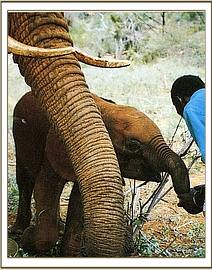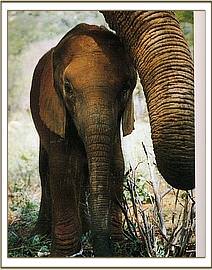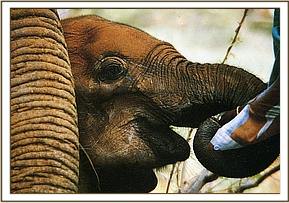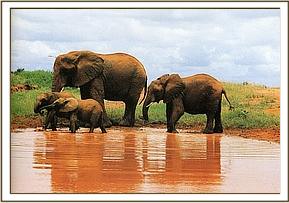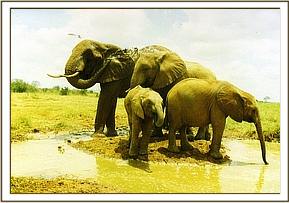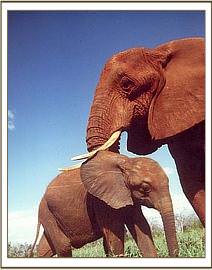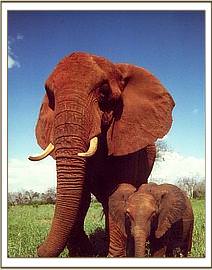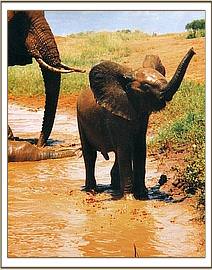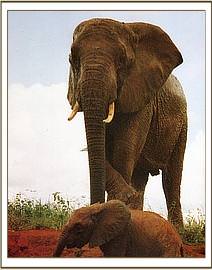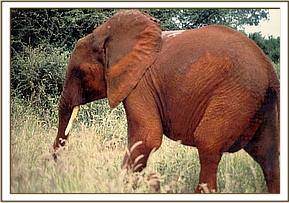


Has fully embraced his wild life in Tsavo East National Park
Current age
39 years old
Gender
Male
Rescued date
15 July 1989
Rescue location
Tsavo Ecosystem, Tsavo East NP
Date of birth (estimate)
1 January 1987
Reason orphaned
Poaching
Age at rescue
2 years old (approx)
Current location
Living Wild
Chuma, was a poaching orphan. He was 8 months old when he lost his mother and elephant family and was in good condition when found, so he was able to be handed directly into the care of the then famous Orphan Matriarch, “Eleanor” who was based at the Voi Park Headquarters. She was kept semi captive during the elephant holocaust years, being worth more alive, than dead, to the corrupt Park officials of the day. But, she could not escape the trauma to which her kind were being subjected, and suffered deeply, receiving the distress calls and cries of those wild as they died in droves on a daily basis. With her was a young female orphan named Lissa, who had been found and rescued by a visitor to the Park. She was orphaned through poaching, as well.
Since Chuma was so small and vulnerable, Eleanor embraced him and showered him with all the love of which only an elephant is capable, whilst Lissa became the self appointed little “Nannie”. The first batch of orphans reared in the Trust’s Nairobi Nursery had yet to arrive in Tsavo and when they did, Eleanor was over-joyed to have a new “family”. Amongst these was the young bull named “Olmeg” who was the very first infant African elephant ever to have been successfully hand-reared from such a young age. Olmeg was just 2 weeks old when he became an orphan and came into the Nursery.
The word “Chuma” means “iron” in Swahili, and elephant “Chuma” was well named, because although still so young, he was resilient enough to complete his milk dependent period down in Tsavo. To have taken him from Eleanor’s care, would have caused her deep emotional suffering, and she had already been subjected to so much Eleanor adored Chuma, who was, after all, her very own adopted “baby”, since she had yet to be blessed with one of her own.
He was extremely bonded to Eleanor, who, after all, replaced his fallen mother, whereas the younger ex Nursery elephants gravitated more towards the Keepers who replaced their elephant family in early infancy. Many were orphaned far too young to be able to recall their elephant family, Olmeg being one. On the other hand, Chuma would have remembered his mother and elephant family clearly, so once he attained the age of ten, he took to spending time away with wild friends and their wild families, sometimes taking Olmeg and the other young males along too. By this time Eleanor was in her forties, and yet to become a mother herself. We began to think that she may be sterile, but once poaching came under control in the early nineties, and the wild herds gradually settled down, she was mated by a wild bull and became pregnant for the first time. Determined not to expose her new baby to humans, whom she believed might take it from her, she left to join the wild elephants when midway through her pregnancy, first diligently entrusting Lissa and Chuma, to her wild friend, the elephant we have since named “Catherine” who is the Matriarch of her own wild family.
For a time, Chuma turned up occasionally, and Lissa continues to do so, along with her two wild born calves, not so much to see the Keepers, but to keep in touch with the other orphans. However, the visits of Chuma became briefer and less frequent with the passage of the years and by 2005, the last time he showed up was 6 years ago. Like his sparring partner, Olmeg, he would now be in his late teens, and as such one of the Trust’s most successful orphans, totally rehabilitated back into, and a member of, the wild elephant community of Tsavo. With Eleanor and her calf, or calves, as well as his male orphaned age-mates now also established as “wild” members of the Tsavo population, there is really no incentive for him to return so the tale of our “iron” orphan, named “Chuma”, is therefore one that we can relate with deep pride. We will never forget him, and we wish him well in Tsavo, the elephants’ wilderness homeland.
Chuma, was a poaching orphan. He was 8 months old when he lost his mother and elephant family and was in good condition when found, so he was able to be handed directly into the care of the then famous Orphan Matriarch, “Eleanor” who was based at the Voi Park Headquarters. She was kept semi captive during the elephant holocaust years, being worth more alive, than dead, to the corrupt Park officials of the day. But, she could not escape the trauma to which her kind were being subjected, and suffered deeply, receiving the distress calls and cries of those wild as they died in droves on a daily basis. With her was a young female orphan named Lissa, who had been found and rescued by a visitor to the Park. She was orphaned through poaching, as well.

View diary updates from across all our orphan units as written by the Keepers

Edo was born in March 1989 in Amboseli National Park, the son of the then famous Matriarch of the E Amboseli Study Group, named “Emily”, who, shockingly died having eaten from an unsecured Lodge garbage pit
By adopting, you play a vital role in the life of an orphaned elephant, rhino, or giraffe — helping us provide the round-the-clock, loving attention each one needs and deserves over many years, so they can ultimately reclaim their place in the wild.
Your adoption supports the 100+ orphans in our care at any given time, covering the cost of milk and food supplies, Keepers' salaries, veterinary treatment, and other essentials.

Celebrate your adoption with a personalised certificate, ready for you or your lucky gift recipient to print and display!

Each month, we send a detailed update about our Orphans’ Project direct to your email inbox, featuring photos, stories, and special highlights.

From the latest Keepers’ Diaries to a downloadable image gallery and more, adopters have exclusive access to our content library.
